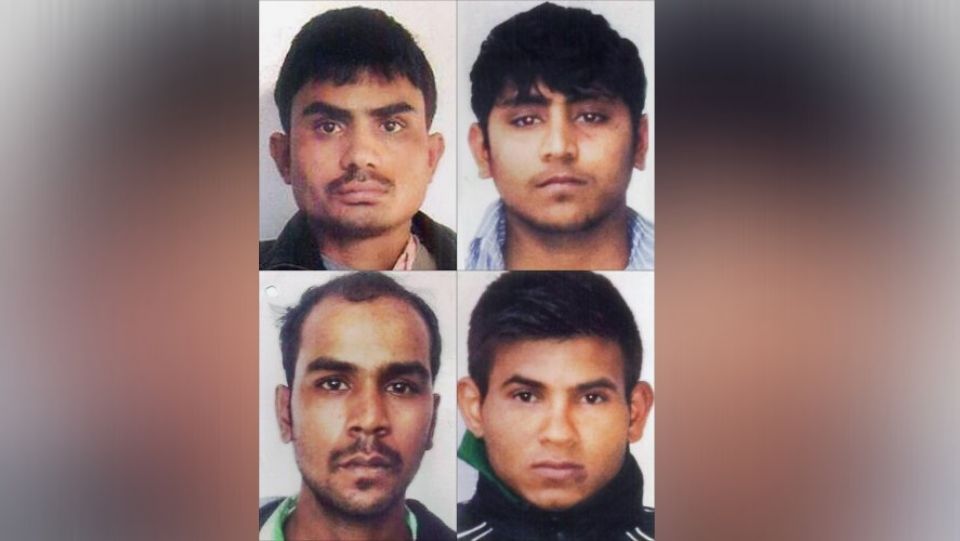
Can't be executed separately: Nirbhaya convicts tell Delhi HC
Solicitor General Tushar Mehta on Sunday told the Delhi High Court the death row convicts in the 2012 Nirbhaya gangrape and murder are deliberately frustrating the mandate of law by getting their execution delayed. The court has reserved its judgment on the Centre's plea challenging the execution of the four convicts.

The four death-row convicts in the 2012 Nirbhaya gangrape and murder case on Sunday (February 2) contended they cannot be executed separately since they were sentenced to death by a common order. Their lawyers said neither the Centre nor the Delhi government has the power to execute them separately.
The submission was made before Justice Suresh Kumar Kait during the hearing of the Centre and Delhi government’s joint plea challenging a trial court decision to stay the hanging of the four “till further orders”. The court has, however, reserved its judgment on the plea.
Senior advocate Rebecca John and advocate Vrinda Grover, appearing for Mukesh Kumar (32), said the petition was not maintainable in view of a recent order by a division bench of the court that the lower court’s order has to be challenged in the Supreme Court. The high court’s order, which John was referring to, had come while declining to hear Mukesh’ plea seeking a stay on the trial court’s earlier order to execute all four on January 22.
Advocate AP Singh, who appeared for the other three convicts, Akshay Singh (31), Vinay Sharma (26) and Pawan Gupta (25), began his arguments claiming there were facts in the case, like the death of accused Ram Singh, were not investigated by the police.
Also read | Nirbhaya case: Tihar authorities move court for execution date of convicts
However, after hearing him on the issue for a few minutes, the court said the arguments were “not relevant” as “trial is over” and the entire case has been decided by the Supreme Court. Subsequently, the court asked him to sit down and thereafter, John commenced arguing.
During her arguments, John said, “The death sentence by the trial court was one composite order and it was upheld as such by the high court and the Supreme Court. If the sentence is common, then the execution has to be common. That is what I am seeking”. She contended “bifurcation” of execution of the sentence was not possible under the law.
John said the Centre was accusing the convicts of working in tandem to deliberately delay process of law, but “what were they (Centre and Delhi government) doing till now”. “They are accusing us of delay. The Centre woke up only two days ago,” she said.
She also contended the Centre was never a party in the case proceedings before the trial court. “It was the victim’s parents who moved the trial court for issuance of death warrants against the convicts. At no point the central government or the state government approached the trial court to immediately issue death warrants,” John contended.
She also questioned the “tearing hurry” in filing the instant petition by the Centre and Delhi government and said that they could have waited for a few days more till the mercy pleas, as well as other remedies of all the convicts, were decided.
Also read | Centre urges SC for victim-centric rules in death penalty cases
She said if mercy plea by any of the others is granted by the President, it would amount to a change in circumstance entitling her client to move another mercy plea. “That is why it is important for me (Mukesh) to wait. My fundamental rights are protected. It is guaranteed under the Constitution. You cannot condemn me for using Constitutional provisions. I can do so till the last breath of my life. My rights are protected until I die,” she told the court.
“I am only asking for a few extra days. No prejudice would be caused to anyone, if we wait. If everything is rejected, the date of execution would not be that far away,” she said and added, “We do not want a posthumous moral tale to be told later.” John told the high court the Centre has moved a plea in the Supreme Court seeking clarification whether co-convicts can be executed separately and this petition is pending before the apex court.
Meanwhile, Solicitor General Tushar Mehta told the high court the death row convicts were deliberately frustrating the mandate of law by getting their execution delayed.
He said convict Pawan Gupta’s move of not filing a mercy petition was deliberate and calculated inaction. They are playing with judicial machinery and trying the patience of the nation, he said. “There is deliberate, calculated and well thought of design to frustrate mandate of law,” Solicitor General Mehta told the high court.
Also read | Tihar authorities delaying in handing over docs, Nirbhaya convicts tell court
A 23-year-old paramedic student, referred to as Nirbhaya, was raped and brutally assaulted on the intervening night of December 16-17, 2012 inside a moving bus in south Delhi by six persons, before being thrown out on the road. She died on December 29, 2012, in Singapore’s Mount Elizabeth Hospital.
One of the six accused in the case, Ram Singh, allegedly committed suicide in the Tihar Jail. A juvenile, who was among the accused, was convicted by a juvenile justice board and was released from a reformation home after serving a three-year term.
The top court, in its 2017 verdict, had upheld the capital punishment awarded to the convicts by the Delhi High Court and the trial court.
(With inputs from agencies)


